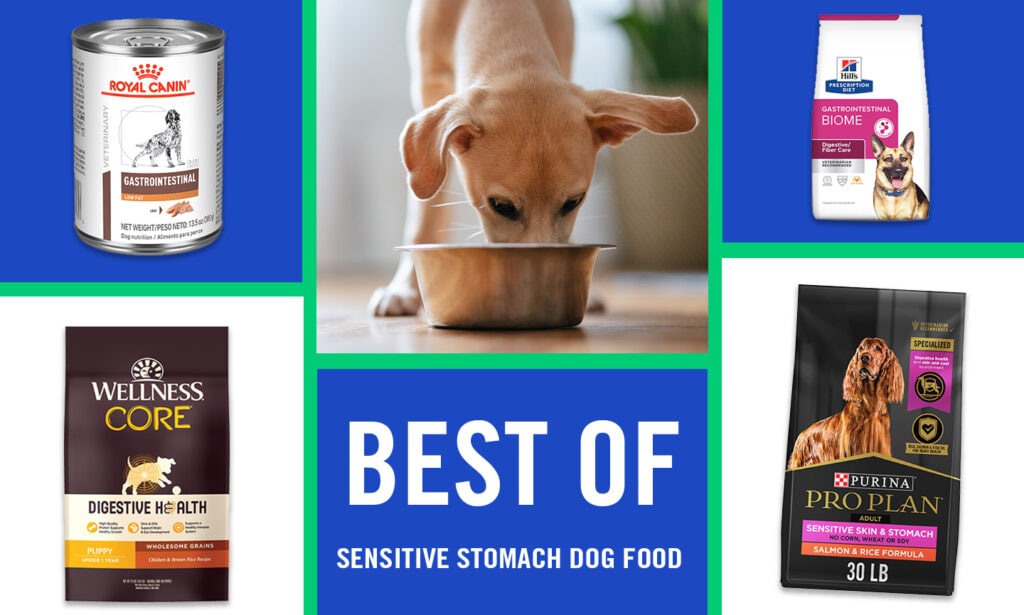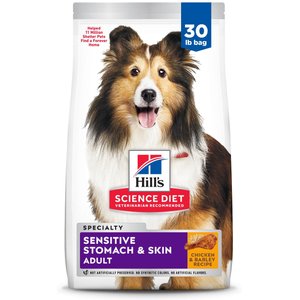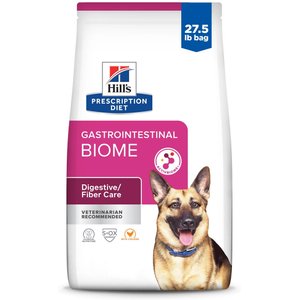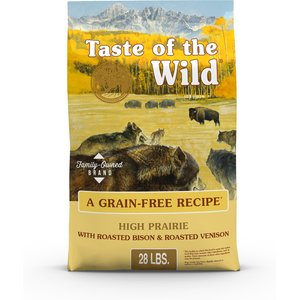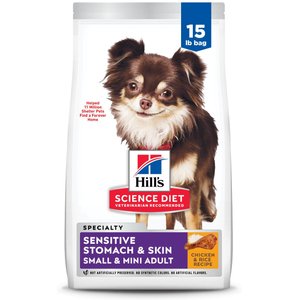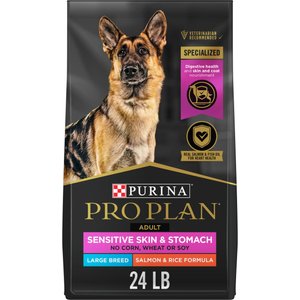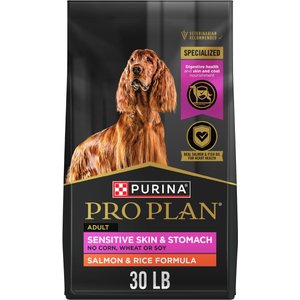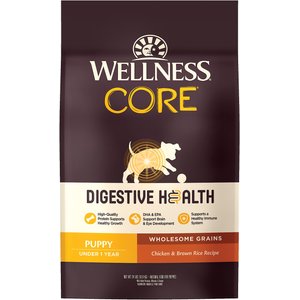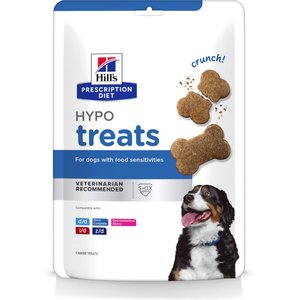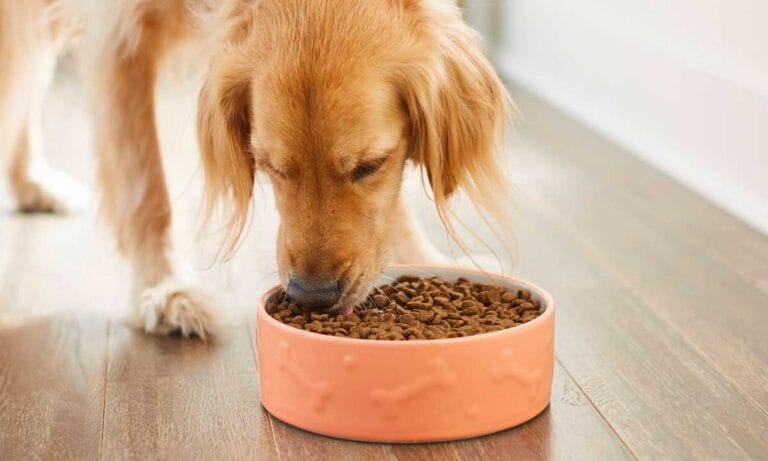Does your canine companion have a sensitive stomach? You’re not alone. Many dogs suffer from digestive issues throughout their lives. While some pets only experience the occasional episode of constipation or diarrhea, other pups with frequent gastrointestinal upset benefit from specially formulated diets that are gentle on troublesome tummies.
Ready for a mealtime makeover? Read on for everything you need to know about how to select the best dog food for sensitive stomachs.
-
1
Best Overall Dog Food for Sensitive StomachsHill's Science Diet Adult Sensitive Stomach & Sensitive Skin Chicken Recipe Dry Dog F... $82 on ChewyFREE 1-3 day shipping$82 on ChewyFREE 1-3 day shipping
-
2
Best Wet Dog Food for Sensitive StomachsRoyal Canin Veterinary Diet Adult Gastrointestinal Low Fat Canned Dog Food, 13.5-oz c... $120 on ChewyFREE 1-3 day shipping$120 on ChewyFREE 1-3 day shipping
-
3
Best Dry Dog Food for Sensitive StomachsHill's Prescription Diet Gastrointestinal Biome Dry Dog Food, 27.5-lb bag $133 on ChewyFREE 1-3 day shipping$133 on ChewyFREE 1-3 day shipping
-
4
Best Grain-Free Dog Food for Sensitive StomachsTaste of the Wild High Prairie Grain-Free Dry Dog Food, 28-lb bag $59 on ChewyFREE 1-3 day shipping$59 on ChewyFREE 1-3 day shipping
-
5
Best Small Dog Food for Sensitive StomachsHill's Science Diet Small & Mini Breed Sensitive Stomach & Sensitive Skin Dry Dog Foo... $56 on ChewyFREE 1-3 day shipping$56 on ChewyFREE 1-3 day shipping
How To Find the Best Dog Food for Sensitive Stomachs
While you always want to select the best food for your best friend, if your dog has a sensitive stomach, finding the perfect fit can be a little trickier.
“If your dog has a sensitive stomach, it’s important to choose a dog food that is easily digestible and gentle on their digestive system,” says Dr. Alejandro Caos, DVM, a Miami-based veterinarian with national, mobile, pet-care service The Vets.
Thanks to advances in veterinary nutrition and science, pet parents today have plenty of options when it comes to diets for sensitive stomachs. While this is great news, it can be easy to get overwhelmed by the number of brands and formulas on the market.
Where to start? Here’s what to consider when selecting a new food for your dog:
- Your veterinarian’s input: “If your dog has a sensitive stomach, it’s essential to consult with your veterinarian for a proper diagnosis and to discuss dietary recommendations specific to your dog’s needs,” says Dr. Caos. “Your vet may recommend specialized prescription diets or provide guidance on selecting commercial diets that are suitable for dogs with sensitive stomachs.”
- AAFCO standards: All commercial dog foods should meet standards set by the Association of American Feed Control Officials (AAFCO), a nonprofit that ensures pet foods contain the necessary nutrient profiles.
- Ingredients: Every pup is different, but dogs with sensitive stomachs frequently benefit from recipes made with a limited amount of quality ingredients, easily digestible carbohydrates and natural fiber sources. (More on that below.)
- Your dog’s age: Select a food formulated for your pet’s correct life stage (puppy, adult dog or senior dog) to ensure they receive the appropriate amount of nutrients and calories.
- Your dog’s size: If purchasing dry food, select an appropriate kibble size for your pet.
- Your dog’s overall health and symptoms: Different foods are formulated to address different health concerns. For example, if your dog’s stomach issues are caused by food allergies, ensure that the food you select does not contain any potential allergens.
9 Best Dog Foods for Sensitive Stomachs
To help you choose, we’ve rounded up the best dog food for sensitive stomachs as tested and approved by Chewy customers. These top-selling, top-rated dog foods get two paws up from dog parents like you.
Best Overall Dog Food for Sensitive Stomachs
-
Works. And B likes
B has to have prescription ID dog food, but this is a nice “add-in” for a different flavor and less costly.
-
A Big Help!
I have a Doodle who has very sensitive skin. This has been the only dog food I’ve tried that doesn’t seem to aggravate the condition.
-
Convenient shipping
Ordering online saved me the time of going to the store, and I was able to get my dog’s food on sale.
Best Wet Dog Food for Sensitive Stomachs
-
Great food
My dog just had to have intestinal surgery and they had to take apart of his intestines and this food has been great for him to get back to himself again
-
Comfort Food
My Bernedoodle has suffered digestive issues three times which sent him to the emergency hospital once and animal hospital twice; while he is was only 2 months old to six months old. I finally changed him to this diet, and he now eats all his food immediate... no more grazing.
-
Love it as a topper to add to the dry kibbles
Our Yorkie loves the combination of the wet and dry kibbles and eats it without any hesitation. She was diagnosed with IBD and with meds and this food combination, her stools have returned to their normal state. No more diarrhea!
Best Dry Dog Food for Sensitive Stomachs
-
Wonderful Food
WOW!! This food is amazing. Worked just as it said on the packaging. Having 2 Pitties with delicate GI systems this food is a miracle!!
-
My Lab laps it up !
I was so pleased to finally see results. In addition to my Lab loving the taste, his diarrhea has GONE AWAY! Thank you Science Diet!
-
A High Fiber Diet
It is what she needs and mixed with the high fiber food it appeals to her and makes her, and my, life better.
Best Grain-Free Dog Food for Sensitive Stomachs
-
Good Quality Kibble
Our dog enjoys this kibble with his supplements, fresh chicken (or other added proteins and his gravy topper for full nutrients)
-
Dogs Love it! good ingredients & nutrition.
High protein and grain free. They love it so we buy it. Recommend this brand in any of the available flavors. We've tried them all except the puppy and never had a problem.
-
Ingredients are geared to the species.
The ingredients in this product are aligned with the biome of dogs. I’m not a fan of commercial kibble but this has made a difference in my Luther’s digestive health. I use it along with his meat diet daily.
Best Small Dog Food for Sensitive Stomachs
-
Great taste!
My dog loves this brand of food. I like that it comes in tiny bites making it easier for men small dog to chew and digest. Great product that I've purchased at least four times along with their wet can food!
-
Expensive but worth it.
My dogs were prone to bouts of diarrhea, since I switched to science diet, they hardly ever get diarrhea, and they love it.
-
The service at Chewy is amazing
My pups love their food and treats. I made a major miscalculation and needed food in 2 days. Chewy accommodated me!
Best Large Dog Food for Sensitive Stomachs
-
Fast service
My dog has been on this food for a while. He loves it.. he has boiled chicken and steamed rice which I make for him, but he also gets dog food this along with fresh pet.. it's a good balance . I like the vitamins that are in the kibble plus he has a variety of dry wet and homemade food.
-
Fantastic food
My Bentley boy had many dry skin patches on his chest, belly & down the inside of his legs. This food cleared up EVERYTHING & he loves it!!
-
Poodle ate it!
My dog has a sensitive stomach and didn’t want to eat much. The vet dog food was very expensive, but we found PURINA pro plan food. Our dog loves it and she doesn’t have any stomach problems! Hooray!
Best Dog Food for Sensitive Skin and Stomachs
-
Great for sensitive tummies
My dog had giardia as a puppy, as well as a number of other stomach and GI issues. Our vet recommended this food, and it has saved our sanity. Our dog is almost 2 and hardly has bad stool, and this formula helped him through all of the rough stomach and health issues we have had. Will always recommend to other sensitive tummy dog parents
-
Order complete and delivered as scheduled.
On the other hand, I continue to receive special advertisements along with a discount code. I have NEVER been able to use the code. It has always been rejected. I now just toss them in the trash.
-
HAPPY TUMMY, HAPPY 13+YEAR OLD PUPPY
ALL YOUR PRODUCTS THAT I PURCHASE FROM CHEWY GET FIVE STARS!!! WHAT MORE CAN I SAY? WAY TO GO TO THE ENTIRE CHEWY TEAM!!! THANKS SO MUCH FOR
Best Puppy Food for Sensitive Stomachs
-
Highly recommend!
We've had our puppy, Husky/German Shepherd/Golden Retriever mix, on another puppy food brand that gave her bathroom emergencies several times in the middle of the night. After doing some research and within 2 days of switching her to this, along with a daily probiotic, her poops have been the most solid they've ever been since we've had her!
-
seems fine
Kibble size is good for my golden retriever. He might be a picky eater though. I always get the chicken flavor and some days he’ll devour it and other days he won’t bother eating it. He also has itchy skin and will gnaw at his paws/legs/tail. So it might be the chicken/and or turkey that’s in the food that he might be allergic to. But he eats it, doesn’t throw up or have diarrhea. He’s 1 now so I’m switching him to adult food. I’ll be sticking with wellness core but doing fish and no chicken products this time to see if that helps him.
-
Awesome and helpful
My lab puppy has had tummy problems since the day I brought her home. I moved her to the regular Wellness Core Puppy food and still had problems. Probiotics from the vet didn't help. Adding yogurt and pumpkin to her food didn't do the trick. Switching her to this did. Markedly so. "Things" are still a little soft, but no more frantic cries from the crate at night nor unpleasant surprises in the morning. Love this food.
Best Dog Treats for Sensitive Stomachs
-
Dogs love it
It’s super to have a treat that your dog loves and at the same time it is made for sensitive tummies.
-
Customer service above and beyond
My order of prescription dog food was accidentally shipped to my old address. The customer service employee had a new order rushed to me and said the company would take care of the mistaken delivery. Sure enough, the new order came promptly and I was still marveling at how nice they were!
-
My Digestive system challenged basset love these treats
I call them the carboard biscuits, but Dora loves them. They are hard and crunchy. The prescription dog treats are the only treat she can digest, so I'm very happy to be able to give her at least one treat in addition to her prescription Z/D food.
How We Chose These Products
Gastrointestinal symptoms are no fun for dogs—or dog parents! That’s why we rounded up only top-selling dog foods for sensitive stomachs that have at least a 4-star rating by Chewy customers. Backed by thousands of ratings and reviews, these bestselling formulas are pet-parent approved.
Guidelines for Feeding Dogs With Sensitive Stomachs
Finding the right food for your sensitive pup may take some trial and error, and introducing the new food requires a slow-and-steady approach. While every pet is an individual, Dr. Caos says to consider the following for your dog’s digestive health:
- Limited-ingredient diets: “Look for dog foods with a limited number of ingredients, as this can help identify and avoid potential triggers for digestive upset,” says Dr. Caos. “Limited-ingredient diets typically contain a single-protein source and a few easily digestible carbohydrates.”
- Novel protein sources: Consider trying protein sources that your dog hasn’t been exposed to before, suggests Dr. Caos. “For example, if your dog has been eating chicken-based food and experiencing stomach issues, switch to a food with a different protein source, like lamb, venison or duck,” he adds.
- Easily digestible carbohydrates: Choose dog foods that contain easily digestible carbohydrates, such as sweet potatoes, brown rice or oatmeal. “These ingredients can provide energy while being gentle on the stomach,” says Dr. Caos.
- Natural fiber sources: Look for natural sources of fiber like pumpkin, beet pulp or prebiotic fibers. “These can help promote healthy digestion and regulate bowel movements without causing irritation,” he says. “Be cautious, as too much fiber may cause constipation.”
- Avoid common allergens: “If you suspect your dog has specific food allergies or intolerances, avoid ingredients known to be common allergens, such as wheat, soy, corn and dairy products,” says Dr. Caos.
How To Introduce New Foods to Dogs With Sensitive Stomachs
It’s always advisable to slowly introduce a new food, but this is especially true for dogs with sensitive stomachs, who are more prone to common food-switching side effects like diarrhea and flatulence.
“It’s important to introduce any new food gradually to your dog’s diet, transitioning over a period of several days to minimize the risk of digestive upset,” says Dr. Caos.
Most experts recommend a week or two for transition. Follow these three steps when transitioning:
- Begin by mixing a bit of the new food into your pet’s current food, for a ratio of 25 percent new food to 75 percent current food.
- After two to three days, if your pet isn’t experiencing any adverse effects, increase the ratio to 50/50.
- Increase the ratio to 75/25 after another two to three days, and then finally fully transition to the new formula.
(For step-by-step tips and troubleshooting, consult our veterinarian-written guide to switching foods.)
Be on the lookout for signs the new formula isn’t agreeing with your pup. “Monitoring your dog’s response to the new food is also crucial,” says Dr. Caos. “If you notice any continued issues or worsening symptoms, consult your veterinarian for further guidance.”
Dog Food for Sensitive Stomachs FAQ
Q: What are the signs of a sensitive stomach in dogs?
A: Dogs with sensitive stomachs may experience gastrointestinal symptoms, including diarrhea, constipation, excessive gas, vomiting, food avoidance, and excessive drooling or swallowing (which are signs of nausea). Consult your veterinarian to determine the cause of the sensitive stomach and develop a treatment plan.
Q: What causes dogs to have sensitive stomachs?
A: Dogs can have sensitive stomachs for a variety of reasons, including food allergies and sensitivities, stress, parasites, bacterial and viral infections, pancreatitis, inflammatory bowel disease, poor diet and cancer.
Q: What dog breeds are prone to sensitive stomachs?
A: Any dog can experience a sensitive stomach, but some breeds are more prone to problems. Irish Setters, German Shepherds, Labrador Retrievers, Shar-Peis, Great Danes, Miniature Schnauzers and Yorkshire Terriers are breeds known to have genetic predispositions to gastrointestinal upset, Dr. Caos says.
Q: Do puppies grow out of sensitive stomachs?
A: Most puppies grow out of sensitive stomachs. The stress and excitement of experiencing new environments can cause an upset stomach, as can eating new foods. Symptoms usually resolve after the puppy is settled into their home and routine.
Q: Is wet or dry food better for dogs with sensitive stomachs?
A: Both wet food and dry food can be appropriate for dogs with sensitive stomachs, depending on what is causing the sensitive stomach and which symptoms are present. Wet food contains more water, so it can be preferable to dogs who experience constipation or dehydration.
Talk to Your Veterinarian
If your dog has a sensitive stomach, a change in diet could help relieve symptoms. However, first consult your veterinarian to determine the cause of any gastrointestinal problems. Together, you’ll develop a personalized plan to address your pet’s stomach troubles, as well as any potential underlying health issues.
Sensitive Stomach: Next Steps
No one enjoys tummy troubles, including our four-legged friends. That’s why it’s important to feed your pup a high-quality diet that’s formulated for their individual health concerns and nutritional needs. It’s just as important to feed the appropriate amount for your dog’s size, age and activity level. Find out how much to feed a dog here.
Expert input provided by Dr. Alejandro Caos, DVM, a Miami-based veterinarian with national, mobile, pet-care service The Vets.
This content was medically reviewed by a veterinarian.
Dig into more dog food topics:
Share:
